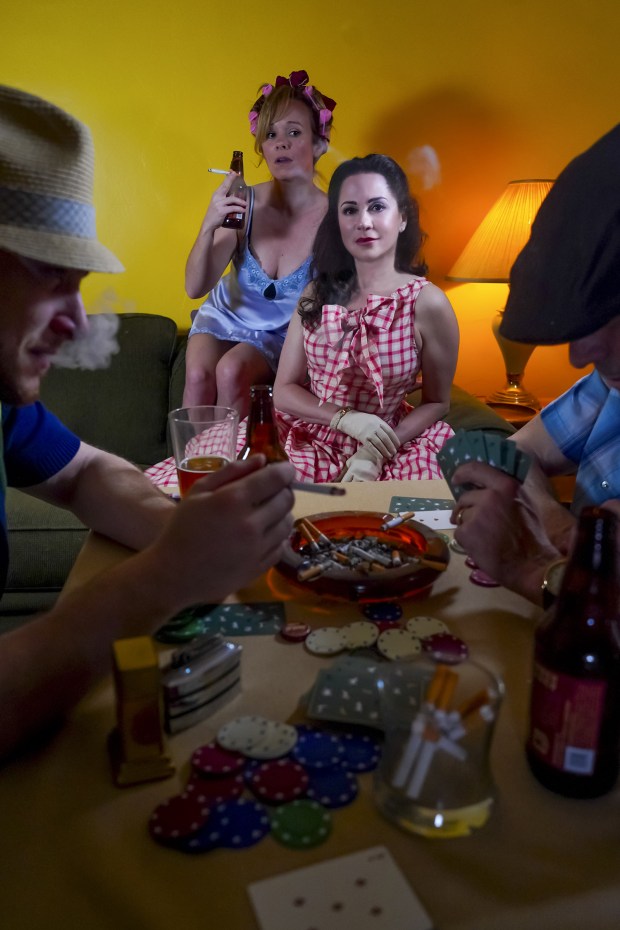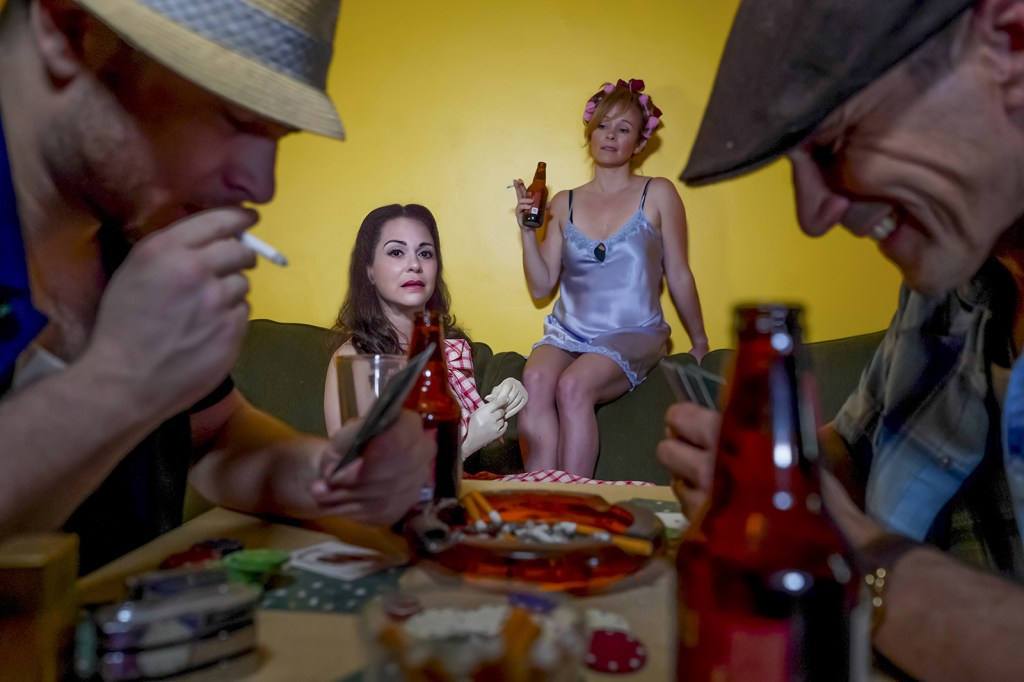Who is Blanche DuBois and why, since she was introduced to audiences nearly 80 years ago, does the fragile spirit of Tennessee Williams’ most famous character seem ephemeral and immortal at the same time?
“She’s funny and awkward and terrible and beautiful and tragic,” said Jessica John, who’s playing Blanche in Backyard Renaissance Theatre Company’s production of “A Streetcar Named Desire,” now in previews at the Tenth Avenue Arts Center downtown. “Tennessee Williams writes a really great character. Any actor who takes it on has his writing, and you’re going to find those things.”
“Streetcar” premiered on Broadway in 1947, directed by Elia Kazan and featuring Jessica Tandy as Blanche, Kim Hunter as Stella, the younger married sister she moves in with in New Orleans, and in a star-making turn, a young Marlon Brando as her earthy but brutish husband Stanley Kowalski. Four years later, the play was adapted into a film, also directed by Kazan, with Brando and Hunter reprising their roles and Vivien Leigh as Blanche in a performance that would win her a second Oscar (after “Gone With The Wind”).
Over the years, an impressive roster of actors — including Jessica Lange, Glenn Close, Cate Blanchett, Ann-Margret and Gillian Anderson — would portray Blanche DuBois on stage or screen.

Backyard Renaissance Theatre
Jessica John, left, and Megan Carmitchel play sisters Blanche and Stella, respectively, in Backyard Renaissance Theatre’s “A Streetcar Named Desire.” (Daren Scott)
Backyard Renaissance’s production, which also stars Francis Gercke as Stanley, Megan Carmitchel as Stella and MJ Sieber as Stanley’s poker buddy (and courtly wooer of Blanche) Mitch, is the first “Streetcar” staged in San Diego since 2008, when it was produced by the bygone Ion Theatre under the direction of Claudio Raygoza. (A planned North Coast Repertory Theatre production in 2020 was scuttled by the COVID-19 pandemic.)
Yet Rob Lutfy, who’s directing the Backyard production, pointed out: “This play is performed every hour of the day somewhere in the world. Surprisingly, in Europe and Japan, it’s performed a lot.”
Among other things, he said, “it has the second most popular balcony scene in all of theater history.” (That would be the iconic “Stella! Stella!”)
For Jessica John, it’s her second Tennessee Williams role after playing Maggie in “Cat on a Hot Tin Roof” in 2005 at Cygnet Theatre.
“At that time,” she recalled, “I thought, ‘Oh my God, this was one of the most incredible writers and one of the most incredible writers for women. It made me think I wanted to play every woman he wrote.
“I’m almost reticent to speak about how much I love this role (of Blanche) and how desperately I’ve wanted to do this play because it puts too much on it. It’s just a story, and we can’t view it as this sacred thing. We have to do it like people.”
While acknowledging that “Streetcar” in its initial production was a case of push-and-pull between Williams, who advocated expressionism, and Kazan, pushing for realism, director Lutfy said that “on the page, it’s a story about sisters that have come from a sexually repressed upbringing and are using very different ways of dealing with their past. There’s also a triangle with Stella being in the center — Stanley and Blanche pulling at the allegiance of Stella.
“I’ve never worked on a play with so much ambiguity. It’s never just one thing. The language is muscular and lyrical. The characters are victims and perpetrators. The beauty of Williams for a director is it’s an actor’s feast. The givens are open enough for the actor to craft an arc that caters to them and where they are in life.”
The complexity of Blanche DuBois is feast for director and actor.
“I want to lean into Blanche’s mental state and how we stage that,” Lutfy said. “What do we trust, what’s a lie and what’s truth? There are times when she speaks an incredible amount of truth, when she’s no longer hiding from the light.”
For John, “what Blanche is dealing with is very human, but then it goes beyond that to survival. Tennessee Williams deals with a tiny issue that is epic in nature, so it’s a little thing like ‘Don’t open the door before I powder’ to ‘I’m going to die on the streets if you don’t give me a place to stay.’
“She’s also a real survivor. She’s got these epic speeches where she is expressing herself so passionately. I find every time as I’m doing that, she’s right. She really has such a view of the world, an unmarried single woman left to struggle and deal with death in her family, with the plantation that the men in the family have basically given away, and she’s had to do it on her own. As crazy and wild as she can be at various points, she also is very grounded and knows exactly what she’s talking about.”
Lutfy has directed John before at Backyard Renaissance with the dark comedy “God of Carnage” in 2023; they were also fellow cast members that same year in a production of “August: Osage County.”

Daren Scott
Actors Layth Haddad, left, Megan Carmitchel, Jessica John and Francis Gercke in Backyard Renaissance Theatre’s “A Streetcar Named Desire.” (Daren Scott)
“She’s a disciplined, hard-working actor,” he said of John, “and she brings a lot of comedy to her Blanche. Blanche is terrified of aging and of losing her ability to command a room of men and be looked at. She has to live in an illusion of reality.”
When women are growing up, John said, “there’s a lot more posing and saying all the right things. As you get older, you say the honest things and people will view you as crazy for saying them. Blanche knows that things have gone off the rails. She even can see how Stella’s life has gone off the rails.
“I really like her. That is what happens. That’s how we grow and age.”
It’s generally believed that Williams based Blanche DuBois on his sister Rose, who was beset with mental health issues and was given a lobotomy against her will. The Stanley character, Lutfy said, finds Williams “delving into the animalistic nature, and ultimately the play’s a tragedy. You can’t get away from that.”
The play’s most famous line — Blanche’s “I have always depended on the kindness of strangers” — punctuates the tragic climax of “A Streetcar Named Desire.” Lutfy suggests that, after all that has taken place in that steamy two-room flat in New Orleans, Williams might have posed something universal.
“In the end,” Lutfy said, “there is a plea for kindness. It’s a challenge for the audience. How do we rely on the kindness of strangers?”
“A Streetcar Named Desire”
When: Previews through Friday. Opens Saturday. 7:30 p.m. Thursdays through Saturdays; 3 p.m. Sundays. (Also 7:30 p.m. Wednesday July 2 and 7 p.m. Monday July 7; no performances July 4-5). Through July 12.
Where: Tenth Avenue Arts Center, 930 Tenth Ave., San Diego
Tickets: $20-$50
Phone: 760-975-7189
Online: backyardrenaissance.com
